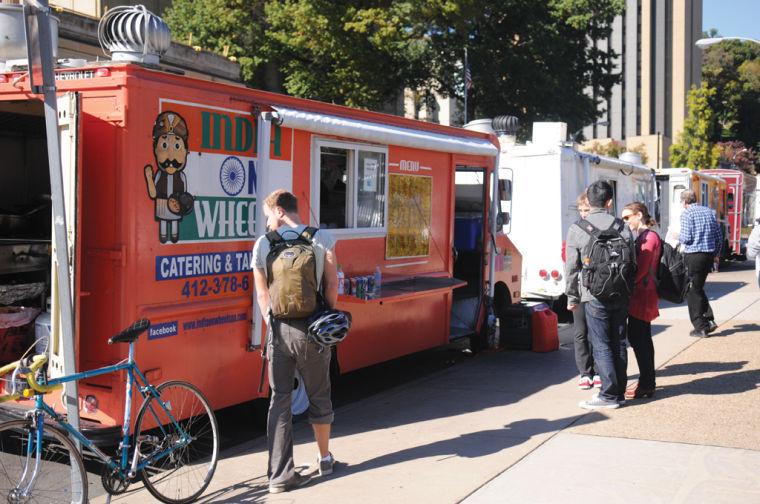Despite challenges, Pittsburgh’s food trucks on a roll
October 28, 2013
For Allison Hilkert, the general manager of the BRGR food truck, food on the go isn’t a term reserved for her busy customers.
The newest craze to hit Pittsburgh is the food truck, an on-the-go restaurant parked on the street that serves both full meals and snacks. Food trucks have been popularized by the Food Network show “The Great Food Truck Race,” and the stationary food trucks located next to Soldiers & Sailors Memorial Hall have been a staple of student life at Pitt for years.
Now, however, food trucks are popping up all over the city.
“The mobility of food trucks are great,” Hilkert said, “We can go to sporting events in the city, catering events and private events, as well as different public festivals that are going on that a normal restaurant wouldn’t have the opportunity to go to.”
BRGR’s food truck is just one of many that now operate in Pittsburgh. With two formal restaurant locations in downtown Pittsburgh and Cranberry Township, Pa., the establishment recently decided to add a mobile version to its repertoire.
“We don’t have the room to do as extensive a menu as our restaurant, but we do our most popular burgers, as well as a burger of the day and a shake of the day,” Hilkert said. “We also offer chocolate and vanilla shakes, fries, chips and cole slaw.”
The most advantageous aspect of food trucks are their ability to move around, serving hungry customers on the go. Food trucks can be found all over the city in various locations.
“Our normal spot is on Forbes and Grant [streets], but we are also going to start going to Washington’s Landing at least once a week,” said Hilkert. “We use Twitter extensively to notify our customers of our location, though.”
Social media plays a huge role in the success of food trucks. From tweeting locations to interacting with customers, food truck owners use the viral nature of social media as an easy method of gaining exposure to potential consumers.
“We use a Twitter account to notify our customers,[of specials and upcoming locations]” said James Rich, owner of PGH Taco Truck, a food truck that can be found outside of Coffee Buddha in the North Hills, but moves all around the city throughout the week.
For the customers — many of them hungry students — the appeal of food trucks comes from the convenience, as well as the fact that they’re feet away from the kitchen where their food is being made.
“Food trucks in general are appealing because you get to see the food being made, it’s often quick while on the go and usually tastes pretty good.” said Aditya Thawardas, a sophomore at Pitt.
Although the mobilility of food trucks affords them with many advantages, the trucks also face a number of challenges posed by regulations, including prohibitions on parking in metered spots and parking in one location for more than 30 minutes. In addition, food trucks are prohibited from operating within 500 feet of a brick-and-mortar restaurant that sells a similar product, all according to a video on the PGH Mobile Food website.
“City regulations really stifle the business and limits where we can legally park to private property, as well as outside of the city,” Rich said.
The Pittsburgh Bureau of Building Inspection lists these regulations on its website under “Vendor Licensing Information.” In chapter 719.05C of the Pittsburgh Pennsylvania Code of Ordinances, it states that, “no peddler shall remain more than fifteen (15) minutes in one (1) location. Upon the expiration of the fifteen (15) minutes, the peddler must begin moving to a location at least two-hundred fifty (250) feet from the first location.” This is the major issue mobile food trucks face.
“It hasn’t been easy,” Hikert said. “We’ve been having to find private lots that we rent to vend, or our festivals that we go to have to be off the public streets. We do have a vendor’s license, but you can’t just pull up on the street and vend freely.”
The obstacles these mobile restaurants face haven’t stopped the trucks’ growth in popularity or the positive attitudes food truck drivers have about their businesses.
“The Pittsburgh food truck scene has changed very rapidly. There are tons more food trucks coming into the Pittsburgh area now,” said Jay Amin, an owner of the mainstay India on Wheels food truck located on Bigelow Avenue in Oakland. “The word spreads really, really fast. The clientele and the word-spreading really motivates us and keeps us going, and that’s a huge part of the food truck business.”



